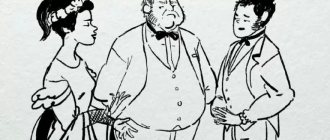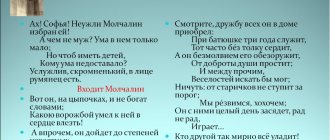Most quoted expressions
“You don’t watch happy hours.” This expression from Sofia Pavlovna’s mouth was directed towards the maid. The girl admitted that the nights spent with her loved one fly by very quickly.
Although popular expressions are usually figurative, its exact meaning is conveyed here. Indeed, when loved ones are nearby, they are so happy with communication that time passes unnoticed for them. When their emotions and feelings are intertwined, they don’t even look for a while.
“The mind and heart are not in harmony.” These are the words of Chatsky when he is trying to reveal his state of mind. It would seem that there is reason, but the heart interrupts it with its feelings.
When a person is in love, he cannot reason sensibly about what is happening, but seems to flow along the river of his feelings. And very often this flow is not correct, but blinded by feelings.
A person is mistaken and comes to a fatal mistake. This expression is used with a touch of emotionality, when you need to go one way, but are pulled to the left.
"The hero is not my novel." The words of Sofia Pavlovna, who explains that those who want to marry her are not worthy of her. The phrase is used when you do not have reciprocal feelings for a person who adores you. You are waiting for something different, someone on a white horse.
“I would be glad to serve, but being served is sickening.” When Chatsky uttered this phrase, he wanted to say exactly what he said. But in reality, we use this expression in relation to professional activities that we want to do independently of top management. Many people want their experience and knowledge to be valued much higher than they currently are.
This is the desire to be in a higher position than now. To be your own boss.
“Day after day, today is like yesterday.” Alexey Molchalin speaks about his measured life. Routine absorbs, all daily tasks can become boring if they are repeated constantly and for a long time.
You always want some interesting things to do and events. This phrase is pronounced sadly. And I want to change something a lot in my life.
“Pass us beyond all sorrows. And lordly anger, and lordly love.” The maid Lisa, speaking these words, was well aware that a relationship with the master was dangerous. But being out of favor with the master is also not sweet.
It is very rare when those in power are ready to throw in their lot with a simple person. Therefore, subjects prefer to be away from both the boss’s anger and his tender feelings.
“Whoever is destined, sir, cannot escape fate.” Lisa spoke these wise words, resigned to what was destined to happen. In modern usage, the phrase has remained with the same meaning. Many people are accustomed to accepting all events in life with the attitude that if it has to happen, it will happen.
“Whoever is poor is not a match for you.” Sophia's father is convinced that not just any person is suitable for Sophia as a husband. The times when rich and poor were divided into classes are long gone. But even now, in some families, children are not allowed to take as spouses those their parents do not like, those whose financial status is lower.
“Who are the judges?” Chatsky became famous for this famous phrase, which is still popular among people. It is customary in society to condemn misconduct, although no one gave them the right to be judges.
Here, in the catchphrase, the word “judges” does not literally mean a professional position, but is used in relation to those who are trying to impose their opinion on others. Although the opinion may be wrong.
Catchphrases from Woe from Wit by Action
Almost after the creation of the comedy, all her quotes and catchphrases were snapped up and went to the masses.
The sharp, apt and figurative catch phrases from “Woe from Wit” were loved by the public so much that they began to be used as folk proverbs.
It never occurred to the poet Alexander Griboyedov that his lines would have such a popular effect in the speech of the entire people.
And if we take into account the fact that the work “Woe from Wit” itself is not very big, then we can say with complete confidence that it is just a bunch of catchphrases.
This page contains the most popular catch phrases from “Woe from Wit”, which are broken down into actions.
Catchphrases from “Woe from Wit”: 1 act
1. “...Pass us beyond all sorrows, And lordly anger, and lordly love.” (Lisa, phenomenon 2)
2. “Happy people don’t watch the clock.” (Sofia, phenomenon 3)
3. “You don’t need another example, When the example of your father is in your eyes.” (Famusov, phenomenon 4)
4. “Blessed is he who believes, he has warmth in the world!” (Chatsky, phenomenon 6)
5. “Where is better?” (Sofia) “Where we are not.” (Chatsky, phenomenon 6)
6. “Will you get tired of living with them, and in whom you won’t find any stains? When you wander, you return home, And the smoke of the Fatherland is sweet and pleasant to us!” (Chatsky, phenomenon 6)
7. “But by the way, he will reach the known degrees, After all, nowadays they love the dumb.” (Chatsky, phenomenon 6)
Catchphrases from “Woe from Wit”: Act 2
8. “I would be glad to serve, but being served is sickening.” (Chatsky, phenomenon 2)
9. “The legend is fresh, but hard to believe.” (Chatsky, phenomenon 2)
10. “The houses are new, but the prejudices are old.” (Chatsky about Moscow, phenomenon 5)
11. “Who are the judges?” (Chatsky, phenomenon 5)
12. “And who in Moscow didn’t have their mouths clamped at Lunches, dinners and dances?” (Chatsky, phenomenon 5)
13. “...evil tongues are worse than a pistol!” (Molchalin, phenomenon 11)
Catchphrases from “Woe from Wit”: Act 3
14. “I’m strange, but who isn’t? The one who is like all fools...” (Chatsky, phenomenon 1)
15. “Ranks are given by people, but people can be deceived.” (Chatsky, phenomenon 3)
16. “The girls have been evil for a whole century, God will forgive her.” (Princess, appearance 
Catchphrases from “Woe from Wit”: Act 4
17. “Oh! if someone penetrated people: What is worse about them? soul or tongue? (Chatsky, phenomenon 10)
18. “Fools believed, they passed it on to others, Old women instantly sounded the alarm - And here is public opinion!” (Chatsky, phenomenon 10)
19. “Ah! How to comprehend the game of fate? A persecutor of people with a soul, a scourge! “Silent people are blissful in the world!” (Chatsky, phenomenon 13)
20. “To the village, to my aunt, to the wilderness, to Saratov...” (Famusov, phenomenon 14)
21. “The husband is a boy, the husband is a Servant, of the wife’s pages is the High ideal of all Moscow husbands.” (Chatsky, phenomenon 14)
22. “So! I have sobered up completely, Dreams are out of sight - and the veil has fallen..." (Chatsky, phenomenon 14)
23. Carriage for me, carriage!” (Chatsky, phenomenon 14)
Quotes from Famusov from “Woe from Wit” (Griboyedov A.S.)
And I ask you, sir, not to really go there, either directly or through a dirt road!
Famusov's words addressed to Chatsky (act 4, phenomenon 14). Famusov Pavel Afanasyevich unexpectedly found his daughter Sofia in the company of Chatsky Alexander Andreevich and attacked them, believing that they were secret lovers. Famusov threatens to send his daughter to the village and demands that Chatsky not meet with her.
And all the Kuznetsky Bridge, and the eternal French
Famusov's words (action 1, phenomenon 4). Famusov Pavel Afanasyevich saw his daughter Sofia in company with his secretary Molchalin Alexei Stepanovich. Famusov is unhappy that his unmarried daughter is dating Molchalin, as he wants to marry her to a rich man with connections in society.
Bah! All familiar faces!
Famusov's words (act 4, phenomenon 14). Famusov Pavel Afanasyevich met his daughter Sofia in the company of Chatsky Alexander Andreevich. Famusov attacks them with abuse, considering them secret lovers.
Dreams are strange, but reality is stranger
Sophia told Famusov a strange dream that frightened her. After listening to her story, Famusov responds with this phrase (action 1, phenomenon 4).
Was granted the highest smile
Words by Pavel Afanasyevich Famusov about his uncle (Maxim Petrovich), who earned the favor of the nobility by deliberately slipping and falling (act 2, phenomenon 2).
To the village, to the wilderness, to Saratov!
Famusov's words addressed to his daughter Sophia (act 4, phenomenon 14). Famusov Pavel Afanasyevich unexpectedly found his daughter Sofia in the company of Chatsky Alexander Andreevich and attacked them, believing that they were secret lovers. With this phrase, he threatens his daughter to send her from Moscow to pear (to her aunt, to Saratov).
In Moscow there is no translation for brides
Famusov's words (act 2, phenomenon 5). Famusov Pavel Afanasyevich asks Colonel Skalozub Sergei Sergeevich about his intentions to marry (Famusov wants to marry his daughter Sofia to Skalozub). During the conversation, Famusov says with this phrase that there are many brides worthy of a colonel in Moscow.
In Moscow they will always increase it threefold
Words by Pavel Afanasyevich Famusov (action 2, phenomenon 3). Famusov, having learned that Colonel Skalozub had come to visit him, tells Chatsky about rumors that his daughter Sofia is allegedly going to marry the colonel. When talking about rumors, he uses this phrase.
You young people have nothing else to do but notice girls' beauties
Words by Pavel Afanasyevich Famusov, in a conversation with Alexander Andreevich Chatsky. Chatsky returned to Moscow after a long journey and visited Famusov’s house. He noticed that Famusov’s daughter Sofia had become prettier. To which Famusov responded with these words (action 1, phenomenon 9).
Here is youth!.. - read!.. and then grab it!..
Words by Pavel Afanasyevich Famusov in a conversation with Colonel Skalozub, who spoke about a relative who left the service, retired to the village and began reading books (act 2, phenomenon 5).
Just by chance, keep an eye on you. So true with intent
Famusov's words addressed to his maid Lisa. Lisa, in order to wake up the owners, set the clock hands so that they would play music. Famusov guessed that she had let the watch down on purpose (act 1, phenomenon 2).
You, the current ones, come on!
Famusov's words addressed to Chatsky (act 2, phenomenon 2). Pavel Afanasyevich Famusov told Alexander Andreevich Chatsky how smart and cunning people of his generation are. Famusov ended his speech with this phrase.
Where there are miracles, there is little stock
From Famusov’s response to Sophia’s story about a strange dream that frightened her (act 1, phenomenon 4).
Destroyers of pockets and hearts!
Words by Pavel Afanasyevich Famusov addressed to his daughter Sophia (act 1, phenomenon 4). Famusov called the French, who brought fashionable things and entertaining French literature to Russia, the destroyers of pockets and hearts.
Yes, he does not recognize the authorities!
Words by Pavel Afanasyevich Famusov about Chatsky (act 2, phenomenon 2).
May God grant you health and the rank of general
Famusov's words addressed to Colonel Skalozub (act 2, scene 5). Colonel Sergei Sergeevich Skalozub talks about his military service and its prospects. During the conversation, Pavel Afanasyevich Famusov wishes Skalozub health and career advancement with this phrase.
The door is open for the invited and the uninvited
Famusov's words from a conversation with Colonel Skalozub (act 2, scene 5). Famusov Pavel Afanasyevich speaks to Colonel Skalozub Sergei Sergeevich about the hospitality of the Moscow aristocracy.
There is hardly any capital like Moscow
Famusov's words (act 2, phenomenon 5). Famusov Pavel Afanasyevich asks Colonel Skalozub Sergei Sergeevich about his intentions to marry (Famusov wants to marry his daughter Sofia to Skalozub). During the conversation, Famusov says with this phrase that Moscow is the best city and in Moscow there are many brides worthy of a colonel.
French books make her sleepless, but Russian books make it painful for me to sleep.
Words by Pavel Afanasyevich Famusov about his daughter Sofia (act 1, phenomenon 2).
False ideas
Words of Pavel Afanasyevich Famusov in a conversation with Alexander Andreevich Chatsky (act 2, phenomenon 3). Famusov learned that a distinguished guest, Colonel Sergei Sergeevich Skalozub, had arrived to see him. Famusov tells Chatsky about the ideas that he just expressed in their conversation. Chatsky criticized the existing order among the Moscow aristocracy. Famusov called these ideas fraudulent.
He who is poor is not a match for you
Sophia is in love with Molchalin, a poor secretary, but her father does not approve of their relationship. Sophia tells Famusov her dream, in which there was a poor young man. During her story, Famusov utters this phrase (act 1, phenomenon 4).
All Moscow ones have a special imprint
Famusov's words (act 2, phenomenon 5) from a conversation with Colonel Skalozub. Famusov Pavel Afanasyevich speaks to Colonel Skalozub Sergei Sergeevich about the traditions and orders that have developed among the aristocracy of Moscow. With this phrase he concludes that the representatives of the Moscow aristocracy are significantly different from others.
There is no need for another example when the example of the father is in the eyes
Famusov boasts about how correctly he raised his daughter Sophia (act 1, scene 4).
Is it possible to choose a nook and cranny for further walks?
Words of Pavel Afanasyevich Famusov addressed to his secretary Molchalin (action 1, phenomenon 4). Famusov met his secretary Molchalin in his house in the morning along with his daughter Sophia. He is against their close relationship.
There's no rest, I'm rushing around like I'm crazy
Words of Pavel Afanasyevich Famusov in a conversation with his daughter Sofia (act 1, phenomenon 4).
Well, how can you not please your loved one?
Famusov Pavel Afanasyevich (manager at a government place) tells Colonel Skalozub Sergei Sergeevich that he selects only relatives for service (act 2, phenomenon 5).
Parsley, you’re always wearing new clothes, with a torn elbow.
Words of Pavel Afanasyevich Famusov to his servant Petrushka (act 2, phenomenon 1).
By father and son honor
Famusov's words in a conversation with Colonel Skalozub (act 2, scene 5). Famusov Pavel Afanasyevich tells Colonel Skalozub Sergei Sergeevich that it is customary for the Moscow aristocracy to judge children by the merits and achievements of their parents.
Signed, off your shoulders
Molchalin invites Famusov to discuss the papers, to which Famusov, refusing to waste time on discussion, responds with this phrase (action 1, phenomenon 4).
They will argue, make some noise and disperse
Famusov's words (act 2, phenomenon 5). Famusov Pavel Afanasyevich talks about old men who love to argue.
With feeling, with sense, with arrangement
Pavel Afanasyevich Famusov orders the servant Petrushka to read the notes of upcoming affairs for the week (action 2, phenomenon 1).
Modest, but nothing but mischief and the wind on her mind
Words of Famusov, who flirts with his maid Lisa (act 1, scene 2).
They won’t say a word in simplicity, everything is with an antics
Famusov's words about Moscow young ladies (act 2, scene 5).
Would you ask what the fathers did? We would learn from our elders
Famusov's words addressed to Chatsky (act 2, phenomenon 2). Famusov Pavel Afanasyevich tells Chatsky Alexander Andreevich about the demands that he would make on Chatsky if he decided to marry his daughter Sofia.
Then it was not the same as now
The words of Pavel Afanasyevich Famusov in a conversation with Chatsky about what used to be better than now (act 2, phenomenon 2).
Everything is there, if there is no deception: Devils and love, fears and flowers
Words by Pavel Afanasyevich Famusov about the dream that his daughter Sofia told him (act 1, phenomenon 4).
If evil was to be stopped, all the books would be taken away and burned
Famusov's words (act III, scene 21). Famusov Pavel Afanasyevich speaks about the dangers of learning and scholarship.
Learning is the plague, learning is the reason
Famusov's words (act III, scene 21). Famusov Pavel Afanasyevich and his interlocutors discuss the reasons why Chatsky went crazy. Khlestova suggested that the main reason was that Chatsky abused alcohol. To this, Famusov noticed that the reason for Chatsky’s madness was different - study and scholarship.
What does he say? and speaks as he writes!
Words by Pavel Afanasyevich Famusov about Alexander Andreevich Chatsky (action 2, phenomenon 2). Famusov told Chatsky about the people of his generation. Chatsky was struck by the fact that Famusov extolled groveling before his superiors as a virtue. Chatsky condemned this quality, to which Famusov responded with this phrase.
What a commission, Creator, to be a father to an adult daughter!
Famusov talks about his daughter (Sofia) and two young people in love with her (Alexey Stepanovich Molchalin and Alexander Andreevich Chatsky). Famusov does not like both young men, since they are not rich or noble.
What kind of aces live and die in Moscow!
Famusov's words about rich Muscovites, in a conversation with the servant Petrushka (act 2, phenomenon 1). Pavel Afanasyevich Famusov speaks with admiration to the servant about the merits of the man whose funeral he is going to.






